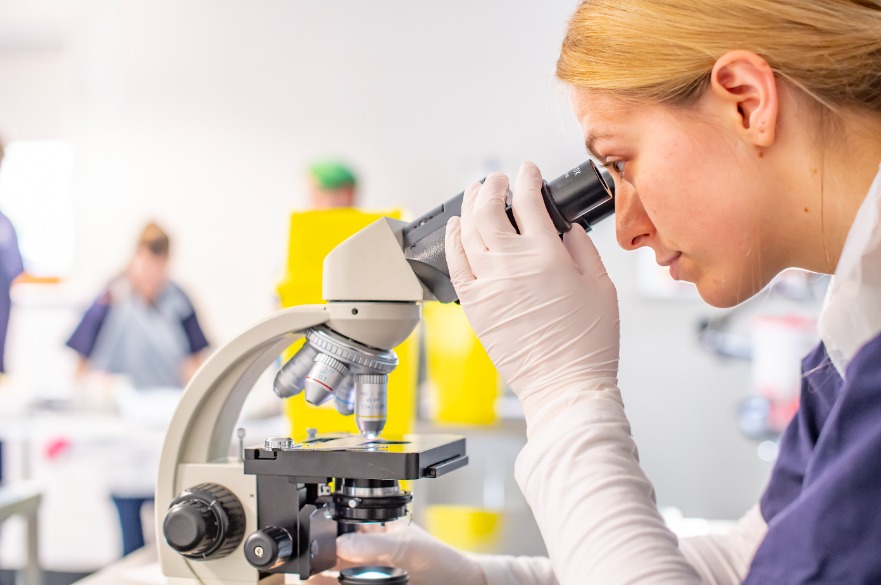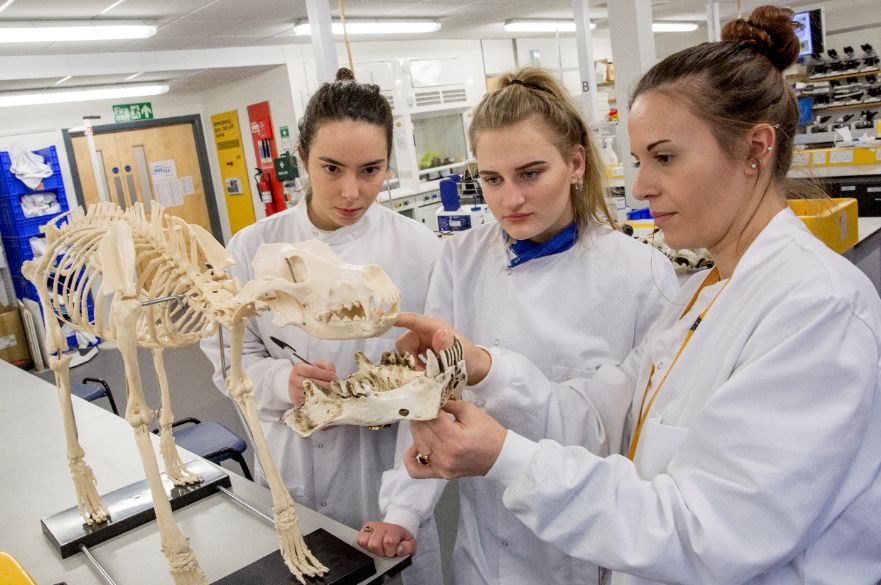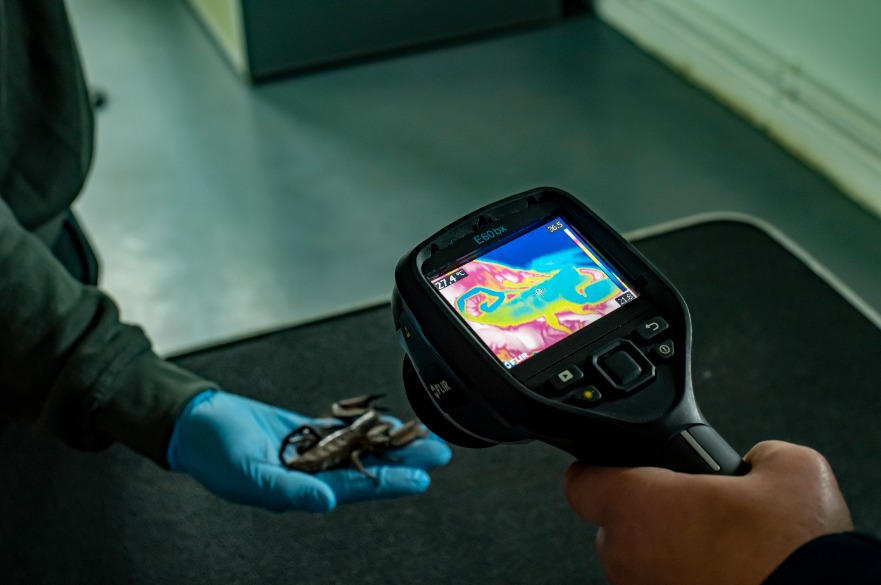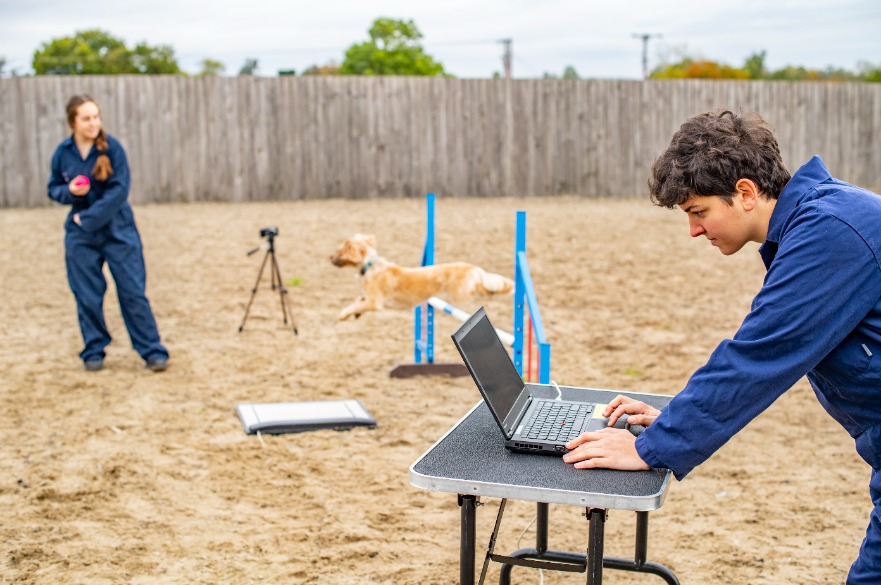Animal Biology BSc (Hons)
- Level(s) of Study: Undergraduate
- UCAS Code(s): C301 / C302
- Start Date(s): September 2023
- Duration: Three years full-time or four years with placement
- Study Mode(s): Full-time / Sandwich
- Campus: Brackenhurst Campus
-
Entry Requirements:
More information
Introduction:
Explore the fascinating animal kingdom and the scientific principles that underpin this important and wide-ranging subject area. The course will give you a sound knowledge and understanding of animal biology. Your lectures will cover major scientific principles, including anatomy and physiology, behaviour, genetics, ecology, and nutrition. The course focuses on the study of companion and livestock species. Core scientific study is supported by practical animal handling in our specialist unit.
Which course is right for you?
We offer four animal science degrees, each with a different focus:
- BSc (Hons) Animal Biology (this course) - focuses on managed domestic species such as companion, working and farm animals.
- BSc (Hons) Zoo Biology - focuses on captive housed zoo animals and exotic species.
- BSc (Hons) Zoology - covers a diverse range of invertebrate and vertebrate species in relation to their biology, evolution, taxonomy and identification.
- FdSc Animal Science - is more vocational, with greater emphasis on practical and applied skills.
-
Based at our Brackenhurst Campus you will have access to our Animal Unit which houses over 250 animals from 70 different species. You'll also benefit from our working farm, including a herd of Lincoln Red cattle, a specialist cattle roundhouse and a flock of sheep.
-
We're ranked third in the UK for Animal Science students who are positive about the assessment and feedback on their course (Full-time first degrees, National Student Survey 2023)
-
We're ranked second in the UK for the number of year-long placement undergraduates studying Animal science (HESA data 2021/22)
-
We're ranked first in the UK for teaching quality in Animal Science courses. (The Times and Sunday Times Good University Guide 2024)
What you’ll study
Don’t just take our word for it, hear from our students themselves
Our current students and recent graduates tell you all about their time at NTU and what they've gone on to do next.
Student Work
Video Gallery
Careers and employability
Your future career
Developed in conjunction with representatives from industry, the course is designed to maximise your potential in a broad range of animal-related careers.
93% of our BSc (Hons) Animal Biology graduates are in work or further study within 15 months of finishing their degrees
(of those available for work or study, latest Graduate Outcomes Survey 2020/21).
Your potential areas for employment include:
- welfare organisations
- feed companies
- governmental department
- non-governmental organisations (NGOs).
Our graduates have become animal feed scientists, laboratory technicians, research assistants, animal health coordinators and programme managers in a range of animal-based organisations. They have gone on to work for companies such as the Waltham Centre for Pet Nutrition and AB Agri. You could also progress to postgraduate study.
Placement opportunities
During your course you'll be supported to gain relevant industry experience and have the opportunity to take a year-long placement. Our students have previously been based at places such as welfare organisations or feed manufacturers.
Students have carried out placements at companies such as:
- Pfizer
- the Animal Health Trust
- the Waltham Centre for Pet Nutrition
- GLW Feeds
- commercial farms.
You will be given the opportunity to focus your studies/work placements on the species of animal that is of most interest to you.
NTU Enterprise
You'll also have the opportunity to turn your ideas into a viable business with help from NTU Enterprise, NTU's purpose-built Centre for Entrepreneurship and Enterprise, a support centre to help students create, develop and grow their own businesses.
Campus and facilities
How to apply
Ready to join us? Then apply as soon as you can. Just click the Apply button at the top of the page and follow the instructions for applying. Make sure you check the entry requirements above carefully before you do.
Writing your application and personal statement
Be honest, thorough and persuasive in your application. Remember, we can only make a decision based on what you tell us. So include all of your qualifications and grades, including resits or predicted grades.
Your personal statement is a really important part of your application. It’s your chance to convince us why we should offer you a place! You’ve got 4,000 characters to impress us. Make sure you use them to show how your skills and qualities are relevant to the course(s) you’re applying for. For more hints and tips, take a look at our page on how to write a good personal statement.
Please remember to include any information about relevant work experience.
Keeping up-to-date
After you’ve applied, we’ll be sending you important emails throughout the application process so check your emails regularly, including your junk mail folder.
You can get more information and advice about applying to NTU on our Your Application page. Good luck with your application!
Getting in touch
If you need any more help or information, please email our Admissions Team or call on +44 (0)115 848 4200.
You can apply directly to the University for an undergraduate course if you’re not applying to any other UK university in the same year. If you are applying to more than one UK university you must apply through UCAS.
Apply as early as you can so that you have time to prepare for your studies. If you need a visa to study here you need to plan this into your application.
- For a step-by-step guide on making an application to the University please visit our how to apply page.
- For advice on applying for a visa please visit our visa information page.
- For advice on how to write a good personal statement please visit our personal statement page.
Keeping up-to-date
After you’ve applied, we’ll be sending you important emails throughout the application process so check your emails regularly, including your junk mail folder.
Good luck with your application!
Getting in touch
If you need any more help or information, please email our Admissions Team or call on +44 (0)115 848 4200.
The University's commitment to delivering the educational services advertised.



